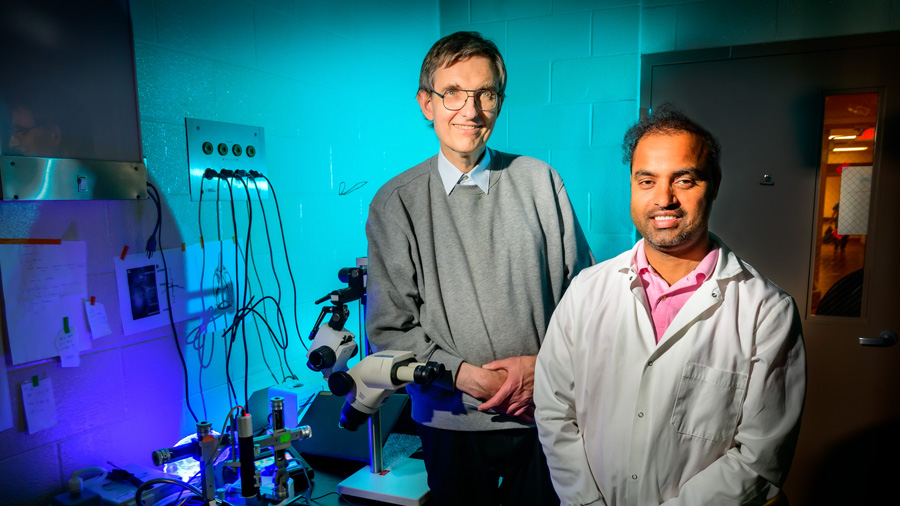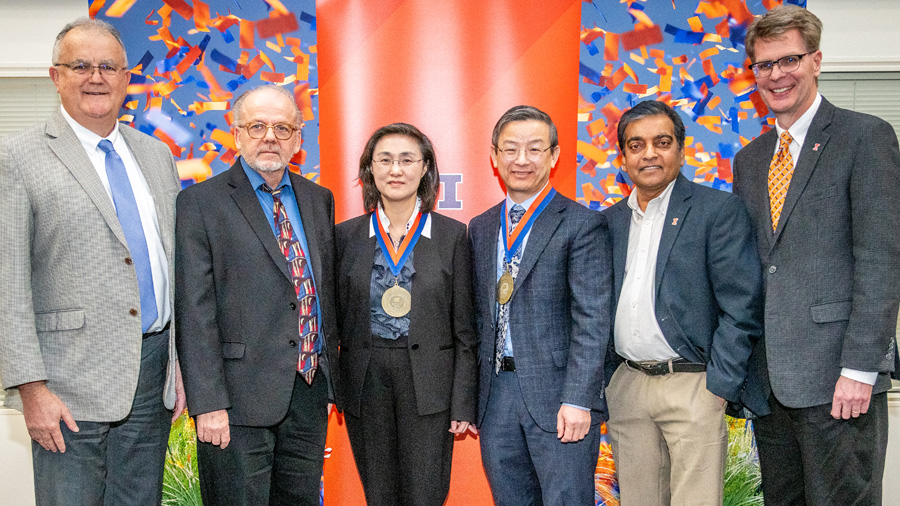Solving complex, multidimensional, interdisciplinary problems
How should research at a 21st century university advance the public good?
That question lies at the center of a three-day conference at the culmination of the University of Illinois sesquicentennial year. One crucial answer—which links scholars across multiple disciplines—is to address urgent and critical threats to human, animal, and environmental health.
As part of the conference, Dr. Rebecca Smith, assistant professor in Pathobiology in the College of Veterinary Medicine, and colleagues from across campus have organized a symposium called “Uniting Infection Biology for One Health.” “One Health” is a conceptual framework that recognizes the interdependence among human and animal health and the health of agricultural, industrial, and natural ecosystems.
Leader in One Health
“The University of Illinois is uniquely positioned to be a leader in One Health. Few other universities offer the combination of a leading genomics research group, which Illinois has in the Carl R. Woese Institute for Genomic Biology, outstanding programs in engineering and agriculture, a strong program in ecology and evolution, and both a veterinary school and a new medical school,” says Dr. Smith.
“Our cross-college partnerships of applied and basic scientists have great potential to solve complex, multidimensional, and interdisciplinary problems.” As an example, she points to a number of Illinois initiatives at the University of Illinois that target the broad and growing problem of antimicrobial resistance:
- Designing novel genome-based tools to track the emergence and spread of antibiotic resistance
- Discovery and testing of novel antibiotics from microbial genomes
- Developing antibiotic alternatives for agricultural and industrial applications
- Engineering healthy microbiomes to resist the spread of antimicrobial resistance
- Identifying molecular mechanisms that mobilize antimicrobial resistance encoding genes
April 11 One Health Symposium
The One Health symposium was proposed by Dr. Smith in collaboration with Dr. Marilyn O’Hara Ruiz, clinical associate professor in Pathobiology, and Dr. Rachel Whitaker, associate professor in Microbiology, College of Liberal Arts and Sciences, and was selected in a competitive process as one of six symposia featured at the 150th conference, which will be held April 10 to 12 at the iHotel and Conference Center in Champaign, Ill. All the organizers are affiliated with the Infection Genomics for One Health theme within the Institute for Genomic Biology.
The One Health symposium, on April 11, will address the topics of antimicrobial resistance and emerging infections in changing environments. Antimicrobial resistance may be considered “the quintessential One Health issue,” organizers assert, because many genes that are key to resistance are transferred between people, animals, and the environment, affecting the health of all three. Emerging infections are also a crucial One Health problem. Ebola and Zika are the most recent high-profile infectious diseases to emerge as a consequence of increased global connectivity and changes in climate and land use; estimates place the number of known pathogens associated with emerging diseases at nearly 200, most of which can pass between humans and other species.
Keynote speakers will be:
- Robert Tauxe, Deputy Director of the Division of Foodborne, Waterborne and Environmental Diseases at the Centers for Disease Control and Prevention;
- Stuart Reid, Principal of the Royal Veterinary College, University of London, where his research focuses on epidemiology and public health;
- Tom Gillespie, associate professor at Emory University, with a research focus on ecology and emergence of pathogens in wildlife, domestic animals, and people.
In addition, lightning talks and panel discussions led by researchers at the University of Illinois will highlight the collaborative interdisciplinary efforts on this campus surrounding One Health initiatives.
Grant for One Health Graduate Course
Indeed, Illinois is emerging as a regional center for One Health research that unites faculty in biomedical sciences, anthropology, epidemiology, engineering, ecology, evolution, computer science, genomics, and microbiology. One Health was identified as one of the pillars of the Interdisciplinary Health Sciences Institute, a new research institute on campus.
In addition, the Center for Global Studies has recently funded the creation of a new interdisciplinary course in One Health through the Global Intersections Grant program. Sulagna Chakraborty, a doctoral student in Community Health, and Lee Ann Lyons, a doctoral student in Pathobiology, are leading the development of the course, titled “One Health: Interdisciplinary Knowledge of Infectious Diseases.”
Dr. Ruiz and Dr. Flavia Andrade, associate professor in Community Health, are serving as mentors for a research team of approximately 25 students and faculty members who will develop a course for graduate students and upper-level undergraduates by spring semester 2019. As part of the grant, a One Health workshop will be held on Tuesday, April 10, in conjunction with the 150th conference. It will feature a speaker from the Indian Veterinary Research Institute, Srikanta Ghosh, who will inspire students to get interested in international research experiences.
—Da Yeon, Eom

![[one health symposium]](https://vetmed.illinois.edu/wp-content/uploads/2021/04/news-one-health-symposium.jpg)


